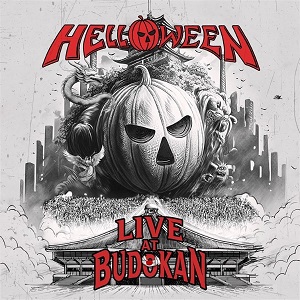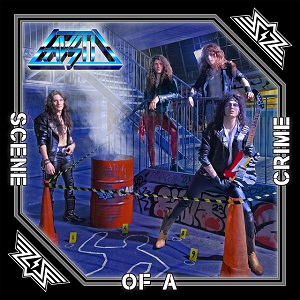STRYPER Frontman MICHAEL SWEET To Satanist - "We Really Are All Brothers And Sisters"
May 20, 2021, 3 years ago

In a new interview with music journalist Joel Gausten, Stryper singer/guitarist Michael Sweet discusses a variety of topics, including the just-released debut album, Evil And Divine by Sunbomb, his collaboration with L.A. Guns guitarist Tracii Guns. Additionally, Sweet (a Christian) and Gausten (a Satanist) engage in a frank discussion on their views on faith and togetherness in the age of COVID-19.
“Michael is one of my favorite people in the music business: Open, giving, straightforward and someone who calls it as he sees it,” Gausten says. “We approached things as gentlemen in a very frank and honest way and – gasp – reached common ground on many things. Michael has my deepest respect and gratitude for his willingness to engage in a chat of this nature.”
An excerpt from the chat appears below:
Gausten: I want to switch gears and bring up a topic that I’ve wanted to talk with you about since the beginning of the pandemic. There have certainly been times over the course of the past year when I’ve watched the news, lost people due to the virus or experienced various other things, and the song I’ve referred to most in these times is the Stryper song ‘Lost’ from God Damn Evil. That’s certainly helped me feel a bit uplifted when I needed that experience. Obviously, you’re a Christian artist. As such, a lot of people look to you to use your faith as a way to project positivity and something they can find solace in. How has your faith enabled you to continue to be that public messenger? At the same time, how has your faith helped you personally deal with the unprecedented challenges we’ve all been facing for the last several months?
Sweet: "My faith has certainly helped me get through the past year and a half especially – and my entire life. The darkest point of my life was 2007 through 2009 (with the illness and passing of my first wife, Kyle). That being said, I fall into depression; I get bummed out, concerned and fearful like everybody else. I’m flesh and blood and human, and it happens to all of us. But my faith does help me get through it. My faith runs really deep. Whether other people believe it or not, I believe that God has helped me and kind of steered the ship throughout my life. I’ve seen it firsthand; I’ve seen miracles and things that shouldn’t have happened that made me say, ‘Wow! Okay, I believe.’ I see it over and over again. Certainly, right now at this point in time, it would be a really easy time for me to lose my faith and to walk away from my faith. I’ll be honest; sometimes, in the back corners of my mind, I question God, too. I think, ‘Hello. Where are you? I don’t see you.’ I’ve been there and done that many times. But somehow and some way, maybe through a simple prayer or maybe through a scripture or someone calling or texting me, I zero in on my faith again and say, ‘Okay. This is where I need to be and where I want to be’ and continue down that path.
Gausten: I appreciate your answer. One thing I’ve always admired about the opportunities I’ve had to converse with you is your openness and honesty about these issues and that you’ve faced challenges. I think that’s so important, especially these days when I think our greatest strength comes from finding commonality with people.
Sweet: "Absolutely – no doubt about it. Even though it’s a cliché that’s used so many times and almost corny, we really are all brothers and sisters. We’re part of one race. It bums me out to see such division over race still. It’s another cliché, but all lives do matter. We’re all brothers and sisters just trying to figure out life and trying to get through it, survive, pay our bills and put food on the table. In that process, we should be concerned with each other more. We should love one another more and take time for one another. And we don’t, because we’re so caught up in the craziness of this world and our schedules – get up, brush your teeth, eat your breakfast, go to work, come home, eat your dinner, go to bed and pay those bills every month. It’s a struggle we all face, but because of all that stuff, we lose sight of the most important part – which is to love one another. That’s my view."
Gausten: Absolutely. No matter what religious inclination we have, we all know we start our physical life at Point A and end it at Point B. Some folks like yourself believe in Point C, and that’s fantastic, but we all have those struggles from Point A to Point B. I think the goal is to find some kind of common ground, whether it be through music or whatever. That’s the lesson I think we should take from the last 12 to 15 months.
Sweet: "For sure. It’s interesting, because you do see that lesson being learned and applied by some – but yet by others, it’s almost the complete opposite."
Gausten: That leads to my next question. Your Facebook page is my favorite to follow – not necessarily because I agree with every word you post; I certainly do not – but I find it refreshing that an artist like yourself – who has a fanbase that may or not follow you in some of your thoughts – still posts what’s on your mind. I find that increasingly rare with a lot of musicians, especially when everything kind of results in a finger being pointed. Why is it important for you to continue to take that position and use social media in the nature you have?
Sweet: "My thinking is that maybe it’ll help somebody. It’s not about Michael Sweet; it’s about much more than that. I’m guilty of this too, but some artists’ pages are always about promotion. I do a lot of that myself, but at the same time, I want to make it about helping people. I want to make it about inspiring and encouraging people. That’s the most important part to me – and also on my tombstone, if it’s written that they remember that, ‘Well, I didn’t always agree with this guy, but he was the real deal. He wasn’t this way in public and then that way in private.’
"I’ve met so many people who are one way in public and another way in private. I want to say to them, ‘Why don’t you just be this way in public? What’s wrong with that? Why do you have to present this fake façade image?’ It’s just so weird to me. For example, you’ve got Tom (Araya) with Slayer. I respect Tom – this is no disrespect to him at all – but he’s in Slayer with pentagrams and this image and (mimics Araya’s singing style), and then he’s a church-going Catholic, you know? And that’s great, but my point is, I want to be the same Michael Sweet on stage and off stage. I feel that’s who I am. You might come into my life and spend a day with me and hear a few f-bombs come out of my mouth, and you’ll go, ‘Whoa, I wasn’t expecting that from Michael Sweet!’ But I’ve talked about that before; I’ve said, ‘Yeah, I drink. I smoke. I swear occasionally.’ I’m flesh and blood; I don’t pretend to be something that I’m not."
Gausten: Frankly, I think that makes what you’re saying even more valid.
Sweet: "Well, it’s important to me – being real, flaws and all. Because I am real and because I lay it all out there, that also opens the door to turn people off and lose fans. I have a lot of Christian fans who follow what I do and what we do, and when they hear I’ve just smoked a cigar, they’re unfollowing me. I just think, ‘Wow. Okay.’ Those are the people who don’t get it, in my opinion. It’s all about judging, and it’s all about the small, little piece of what life should be and what the message should be instead of the entire piece. I just feel like, wow, it’s so backwards and so old. It’s such an old way of thinking, and we need to progress. I just want to be honest. I would love to go to a church and have a pastor come out and say, ‘Man, I got drunk last night. I could hardly wake up this morning. I’m not saying that’s a good thing, but it happened, and I just want you all to know that these are the things that happen in my life. I’ve got issues with this or issues with that’ – just that real, from-the-heart mentality."
Gausten: Well, the ability to embrace obstacles and overcome them is what I feel is perhaps most in line with God.
Sweet: "Yeah! What happens often is that people pretend to be something; when they fall, everyone’s blown out of the water. We all fall. Every single person. I don’t care who you are; you have some issue, some weakness, some temptation – something. We all fall, but we like to point fingers at those who do fall and not at ourselves when there’s so much in our closets hidden deep away."
The complete interview is available at this location.











